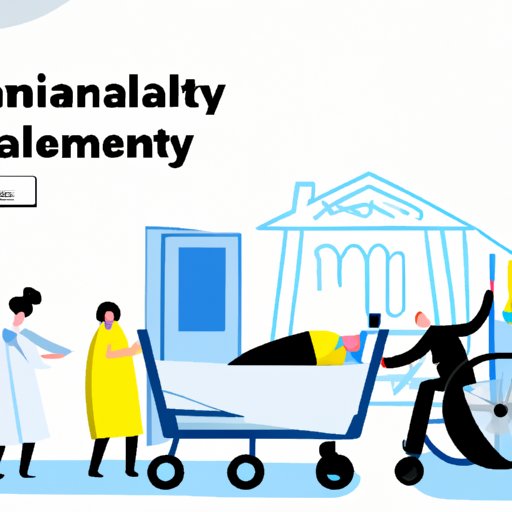Introduction
When a loved one is diagnosed with a terminal illness, it can be an overwhelming and emotional time for families. Along with the physical and emotional stress of the diagnosis, there is often the difficult decision of whether to choose hospital care or home care for the patient. While both options have their advantages and disadvantages, it is important to consider all aspects before making a decision. This article will explore the pros and cons of hospital care and home care for terminally ill patients, examining the impact on quality of life, financial costs, family members, and access to resources. Additionally, it will look at patient preferences and the role of medical professionals in advocating for either type of care.
Exploring the Pros and Cons of Hospital Care vs. Home Care for Terminally Ill Patients
Hospital care is an option for terminally ill patients who need more intensive medical treatment than what can be provided at home. There are several advantages to hospital care, including access to specialized medical treatments and equipment, 24-hour medical staff, and access to support services such as social workers and counselors. Additionally, hospital care can provide peace of mind for families, knowing that their loved one is being monitored and cared for around the clock.
However, there are also disadvantages to hospital care, such as the cost of medical treatment, transportation, and equipment; the lack of privacy; and the risk of contracting an infection due to exposure to other patients. Additionally, some patients may experience feelings of loneliness and isolation due to the lack of social interaction.
Home care is another option for terminally ill patients, providing care in the comfort of the patient’s own home. Home care has several advantages, including the ability to maintain a sense of independence, control over daily routines, and access to familiar surroundings. Additionally, home care can offer a greater sense of intimacy and connection between the patient and family members.
On the other hand, there are also some potential drawbacks to home care. Home care can be costly, and may require additional equipment and supplies, such as oxygen tanks, wheelchairs, and medications. Additionally, there may be limited access to specialized medical treatments and equipment, as well as 24-hour medical staff. Finally, home care can be physically and emotionally taxing for family members, who may be responsible for providing round-the-clock care.

The Impact of Hospital vs. Home Care on Quality of Life for Terminally Ill Patients
The choice between hospital care and home care can have a significant impact on the quality of life for terminally ill patients. When it comes to the quality of medical treatment, hospital care can offer more specialized treatments and equipment, as well as access to 24-hour medical staff. However, home care can provide a more personalized approach, allowing for a greater sense of autonomy and control over daily routines.
Comfort is another factor to consider when choosing between hospital care and home care. Hospital care can provide a sterile environment, which can be beneficial for some patients, while home care can offer the comforts of familiarity and personal space. Additionally, home care can allow for more social interaction with family and friends, which can be beneficial for the patient’s mental health.

A Comparison of Financial Costs Associated with Hospital vs. Home Care for Terminally Ill Patients
The financial costs associated with hospital care and home care can vary significantly, depending on the patient’s needs and the type of insurance coverage. Generally speaking, hospital care tends to be more expensive, due to the cost of medical treatment, transportation, and equipment. On the other hand, home care can be less expensive, although there may be additional costs associated with equipment and supplies, such as oxygen tanks, wheelchairs, and medications.

Examining the Effects of Hospital vs. Home Care on Family Members of Terminally Ill Patients
The choice between hospital care and home care can also have an impact on the physical and emotional wellbeing of family members. In the case of hospital care, family members may be required to travel long distances to visit the patient, which can be physically and emotionally exhausting. Additionally, hospital care can place a financial burden on the family, as they may be responsible for the cost of transportation and other associated expenses. On the other hand, home care can provide more opportunities for family members to spend time with the patient, although it can also place a physical and emotional strain on caregivers.
Families should also consider the availability of support services when deciding between hospital care and home care. Hospitals typically provide access to social workers and counselors, as well as other supportive services, such as chaplaincy and bereavement counseling. On the other hand, home care may not offer the same level of access to these services.
How Access to Resources Influences the Choice Between Hospital and Home Care for Terminally Ill Patients
Access to resources can also be a determining factor in the decision between hospital care and home care for terminally ill patients. It is important to consider the availability of medical facilities, home care providers, and insurance coverage when making a decision. If the patient does not have access to a nearby hospital or home care provider, or if their insurance does not cover the cost of medical treatment, then home care may be the best option.
Understanding Patient Preferences for Hospital Care vs. Home Care for Terminally Ill Patients
Ultimately, the decision between hospital care and home care should be based on the individual needs and preferences of the patient. Factors to consider include the patient’s prognosis, level of dependence, and personal preference. For example, a patient who is expected to have a longer life expectancy may benefit from the specialized medical treatments and equipment available in a hospital setting, whereas a patient who is nearing the end of their life may prefer the comfort and familiarity of home care.

Exploring the Role of Medical Professionals in Advocating for Hospital or Home Care for Terminally Ill Patients
Medical professionals play an important role in advocating for the best possible care for terminally ill patients. They can provide guidance and advice to help families make informed decisions about the type of care that is most appropriate for their loved one. Additionally, they can refer patients and families to appropriate resources, such as hospice care and palliative care.
Conclusion
When faced with the difficult decision of choosing between hospital care and home care for a terminally ill patient, it is important to consider all aspects of the situation, including the impact on quality of life, financial costs, family members, and access to resources. Additionally, it is important to understand the patient’s preferences and the role of medical professionals in advocating for either type of care. Ultimately, the decision should be based on the individual needs and preferences of the patient, taking into account all factors involved.
(Note: Is this article not meeting your expectations? Do you have knowledge or insights to share? Unlock new opportunities and expand your reach by joining our authors team. Click Registration to join us and share your expertise with our readers.)
